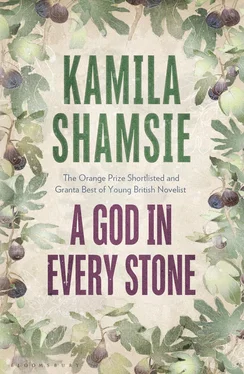Kabuli Gate was closed, but as he approached it opened to allow a car driven by an Englishman to drive in. Running, he was through, and within the Walled City again.
— Stop. Stop right there.
Strange, how a command delivered in an English accent still made him want to salute. He turned towards the voice, and there was an English officer with two sepoys on either side of him, their rifles pointed at Qayyum.
— Lance-Naik Qayyum Gul, 40th Pathans. Sir!
The sepoys looked uncertainly at the officer, who signalled to Qayyum to approach him, his expression entirely disbelieving.
— On leave, are you?
— Discharged due to injuries sustained in battle, sir.
— Which battle?
— Vipers, sir. Ypres.
Of all the words known to the English, only Somme had greater power. Not King, not Country, not Christ could stand against Ypres. Even so, he didn’t expect the Englishman to step forward and hold out his hand.
— My father died there. Royal Fusiliers.
Qayyum took the Englishman’s hand, unable to discern if he was feeling anything at all beyond anxiety that a green-eyed woman might be watching him from a balcony down the street, aiming a pistol at his head.
Viv picked her way among the severed hands, the headless torsos, her shoes leaving faint prints in the dust of the chequered tiled floor. The groupings were by body parts: arms and feet and heads and torsos and legs of all sizes together, like placed with like so that variety might emerge.
The stout man in the Museum had told her that it had been Najeeb’s idea to undertake the cataloguing of detritus: all the excavated pieces too fragmented, too poorly crafted to ever have a hope of being displayed. Such work was a labour of labour, he said, and no one else showed much enthusiasm for it, but Najeeb had obtained permission to turn the elongated reception room of a departed official’s house into a field of broken stone. A notebook lay on the window ledge, and Viv picked it up. Item 1. Takht-e-Bahi 1911–12. Torso with drapery, stump of left arm ending above elbow. 18.7 L. Crude. Late Kushan? She walked over to the cluster of torsos, located the one with the number 1 chalked onto it, walked to the next one, read the accompanying entry. Continued on, feeling the world steadying around her for the first time in the day.
Item 184. SKD 1908–9. Left hand. 5.5 L x 2.8 W. Lower-right palm missing. Three fingers curled into fist. Index finger bent at first and second joint. Effective foot scratcher. Sliding her foot out of its shoe she rested it against the extended index finger of the upturned Gandhara hand and moved it forward and back. There were pleasures large and small here from the foot-scratching hand to the jigsawing together of a fish-tail with a human torso to reconstitute an ichthyocentaur from Takht-i-Bahi. But her favourite thing of all was Najeeb’s pairing of two abraded heads of almost identical size, one Greek in features, one Indian, separated by three centuries or more. He had laid them down in profile so they looked each other in the eye, their mouths inches apart each other. Was this an expression of his own proclivities or an acknowledgement of the passionate intimacy of Pathan men, sexual and otherwise? Who had the boy she’d adored grown into, and how long would it be before movement in and out of the Walled City would become possible again so she could find out?
But how extraordinary that his brother should turn out to be the one-eyed Herakles. She smiled at the memory of their mutual wonder, and wished he hadn’t run out so abruptly. She had asked the peon what he and Mr Gul had said to each other in Hindko, and his answer was an unhelpful Nothing, memsahib, though he was more obliging when the stout man asked him to accompany Miss Spencer to the house of fragments.
A cool breeze, accompanied by the heavy clatter of water. The peon had turned the garden pipe onto the bamboo blinds of the verandah which ran along one side of the house. Viv walked over to the window and leaned out, calling out her thanks to the dark shape on the other side of the blinds. Easing herself onto the window frame, she swung her legs out and stepped down so she was in the shadowed verandah. She fanned the front of her blouse to bring some relief to her clammy skin and moved forward to look through the chink between blinds, wet bamboo against her cheek; the colours in the garden were bleached by sunlight, tree limbs sagging. Viv had a brief, glorious, image of a jugful of ice cubes which she could pour down the front of her dress, but felt too stupefied by the heat to go in search of a kitchen. Foolishly she sat down on a wicker chair, and then it was doubtful she would be able to get up again. She watched a bead-eyed lizard dart up the wall and stop, stilling entirely, as though, having sped towards this spot, it couldn’t remember why it wanted to be here or think of what next to do.
She must have fallen asleep in the shaded verandah because the light was muted when she opened her eyes and saw the peon bending over, his hands resting on his knees, looking at her in concern. He jumped back, apologising, and she shook her head which seemed to be the only part of her awake — everything else gripped by sleep.
— Water, she said, and he held out a glass filled with liquid. She drank more than half its contents before tossing the rest of it at her face and neck. The water was warm, but even so, it did the trick of rousing her, though she hadn’t anticipated the transparent rivulets that would snake down her blouse.
— Thank you, she said.
— Memsahib, the peon responded in a tone which did no more than acknowledge she had spoken.
Memsahib. Such a peculiar word. In this country filled with titles and honorifics nothing pre-existing had suited Englishwomen; while the ubiquitous ‘sahib’ came to rest comfortably on the shoulders of Englishmen, something other than ‘begum-sahib’ had to be devised for their female counterparts. As if to say that Englishmen and Indian men, for all their differences, could still be described in the same language but the women of the two races were so far apart that they had to be categorised separately, kept separate.
— What is your name?
— Dil-daraz.
— Dil-daraz, there was a woman in the museum with me. She would have been leaving as you arrived. Have you seen her before?
The boy slid a bare foot back and forth in the dust, and moved his head in that way which was halfway beneath a yes and a no.
— Memsahib, no, but she said to say something to you. I didn’t want to bother you with it.
— What did she say?
— She said all she wants is to know where her sister is. If there is anything you hear, she lives in the carpet-seller’s house on the Street of Storytellers. Chand Carpets, anyone can tell you which it is.
— I know Chand Carpets. Thank you, Dil-daraz.
— Memsahib, I hope this doesn’t trouble you.
She shook her head, and stood up to leave accompanied by the boy, Dil-daraz — the most unlikely-looking character to have the name ‘Heart’s Drawer’. The space between dreams and reality was wider in India than anywhere else in the world.
The Forbeses still lived in the bungalow with a garden which was exceptional in its lushness even by the high standards of Peshawar. Viv followed the young man in white livery, who looked disorientatingly like the old man in white livery who had worked here in 1915, along the pathway shaded by trees so tall only the top of St John’s spire could be seen through them. When she entered the bungalow and closed the door behind her everything was plunged in darkness, the heavy curtains muffling light more successfully than it kept out the late-afternoon heat; but gradually, outlines became objects and Viv found herself surrounded by the familiar disorder of Forbes books and Forbes shoes. And then there was Mr Forbes walking in from the door which led to the garden — the spade in his arms and the grass stains on his trousers indicating that the same person who would draw his curtains against the day would then step out and toil in it.
Читать дальше












